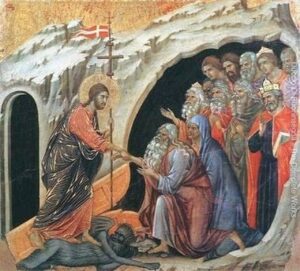Holy Saturday —we anticipate the resurrection and Easter’s triumph over the darkness and evil, sin and death. It is, therefore, a day of quiet and prayerful reflection on the true gravity of the crucifixion and Jesus’ redemptive sacrifice. So why do we read in the Apostles Creed that Jesus descended into hell?
Apostles Creed
I believe in God, the Father Almighty, Creator of Heaven and earth. In Jesus Christ, His only Son Our Lord, Who was conceived by the Holy Spirit, born of the Virgin Mary, suffered under Pontius Pilate, was crucified, died, and was buried. He descended into Hell; the third day He rose again from the dead; He ascended into Heaven, and sitteth at the right hand of God, the Father almighty; from thence He shall come to judge the living and the dead. I believe in the Holy Spirit, the holy Catholic Church, the communion of saints, the forgiveness of sins, the resurrection of the body, and life everlasting.
What The Bible Says
In 1 Corinthians 15:12-17, we read.
“But if Christ is preached as raised from the dead, how can some among you say there is no resurrection of the dead? If there is no resurrection of the dead, then neither has Christ been raised. And if Christ has not been raised, then empty [too] is our preaching; empty, too, your faith. Then we are also false witnesses to God because we testified against God that he raised Christ, whom he did not raise if, in fact, the dead are not raised. For if the dead are not raised, neither has Christ been raised, and if Christ has not been raised, your faith is vain; you are still in your sins.”
And In Marks Gospel Chapter 16 verse 6
“He said to them, “Do not be amazed! You seek Jesus of Nazareth, the crucified. He has been raised; he is not here. Behold, the place where they laid him.
Why Jesus Went To Hell
 It is important to understand that he did not go to hell to deliver the damned or destroy hell but free the just who had gone before him. He did not go to suffer. He went to bring the good news of salvation. Hell (Hades in Greek or Sheol in Hebrew) is the place of the deceased, not solely the place of the condemned, but the place also where the prophets and saints of the Old Testament awaited their just reward. Under the hypostatic union, he descended as the God-Man, so his descent is vicarious and victorious. In experiencing death as the God-Man, he defeats it. Thus it is not a part of his humiliation, which culminated in the crucifixion. It is the beginning of his exaltation, which culminated in his ascension.
It is important to understand that he did not go to hell to deliver the damned or destroy hell but free the just who had gone before him. He did not go to suffer. He went to bring the good news of salvation. Hell (Hades in Greek or Sheol in Hebrew) is the place of the deceased, not solely the place of the condemned, but the place also where the prophets and saints of the Old Testament awaited their just reward. Under the hypostatic union, he descended as the God-Man, so his descent is vicarious and victorious. In experiencing death as the God-Man, he defeats it. Thus it is not a part of his humiliation, which culminated in the crucifixion. It is the beginning of his exaltation, which culminated in his ascension.
As the Catechism puts it, “The descent into hell brings the Gospel message of salvation to complete fulfillment. This is the last phase of Jesus’ messianic mission, a phase which is condensed in time but vast in its real significance: the spread of Christ’s redemptive work to all men of all times and all places” (no. 634).
